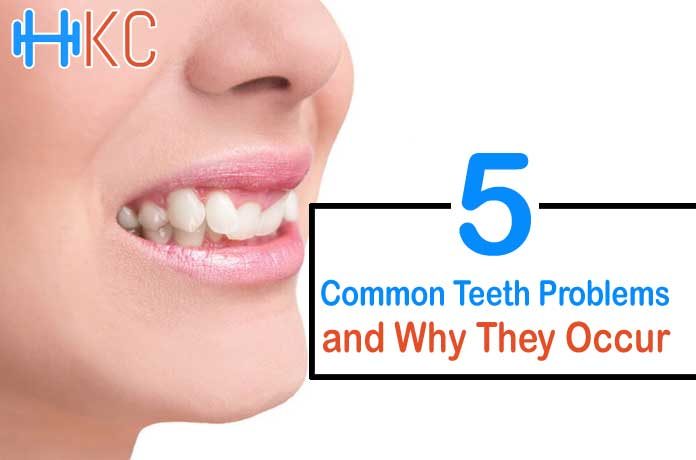5 Common Teeth Problems and Why They Occur
A beautiful pair of teeth is an asset that we all want to have. A pretty smile will make you feel confident; but when your teeth are in bad shape, you can develop low self-esteem. Fortunately, many teeth problems are either preventable or treatable. Some common problems with teeth include;
Unattractive teeth
It is not uncommon to find people grappling with imperfect teeth issues. Most people develop defective teeth from childhood. Others are as a result of accidents, drug abuse, and even wrong posture. Some of these teeth problems include crooked teeth, gaps between teeth, excessively sharp canines, uneven and cracked teeth, and discolored teeth. If you have any one of these conditions, you can visit trusted dentists such as Fort Lauderdale dentists. You will get services such as teeth whitening, dental implants, and cosmetic dentistry so you can start smiling confidently. Below are some teeth imperfections in detail.
- Crooked teeth, over, under, and cross bites
Both babies and adults can have crooked teeth. For babies, the cause may be the teeth being too big to fit into the gum space or the jaw size being too small to fit all the teeth well. Another common cause is thumb sucking and prolonged use of suckers and pacifiers. Genetics may also play a role. Additionally, if your baby loses his or her teeth earlier due to an accident, they may end up growing permanent teeth that are not straight.
For adults, a small and misaligned jaw may be the cause of crooked and misaligned teeth. Other reasons for developing crooked teeth are mouth breathing and tongue thrusting. Facial injury, poor nutrition and dental care, and genetics are also contributing factors.
- Sharp and uneven teeth
Many people have teeth which are uneven in size or shape. It could be canines which are too sharp or teeth which have rugged edges. In this case, a dentist will perform a tooth shaping procedure. The procedure involves removing a small amount of enamel to make long teeth short and to round pointed teeth. Sharp teeth come about as a result of genetics or when the enamel gets eroded.
- Hyperdontia (crowded teeth)
Hyperdontia is a tooth condition where you have extra teeth growing near your regular teeth. The extra teeth can come in different shapes. Two of the shapes are tuberculation; where the tooth has a barrel shape, or supplemental; where the tooth shape is similar to the shape of the tooth near which it is growing. The teeth may also be located anywhere from the back of your mouth to the front near your incisors.
Crowded teeth are associated with hereditary conditions such as Fabry disease and Gardner’s syndrome. You may need to have some of the extra teeth removed if they affect your dental health or cause pain and discomfort.
- Diastema (gaps between teeth)
If the gaps between your teeth make you feel uncomfortable, a dentist can reduce or eliminate the gap. One cause of diastema is when your teeth are too small for the jaw bone. One or more teeth will end up spaced. Diastema commonly occurs with the incisors but can also occur with other teeth. Treatments include wearing braces or use of veneers to fill the teeth gaps.
Tooth sensitivity
If your teeth are sensitive; you experience discomfort when your tooth comes into contact with cold temperatures in water, air, or particular foods. You may also experience pain and discomfort when brushing your teeth. Sensitive teeth can be a result of many factors such as a worn out or corroded enamel or exposed roots.
Tooth sensitivity can also result from tooth cavity, a cracked tooth, or gum disease. A dentist will recommend the right remedy based on the cause of your tooth decay. Some treatments include use of a desensitizing toothpaste or fluoride application to reduce pain and strengthen the enamel. If the issue is with the roots, the dentist will recommend a root canal treatment, which is the most effective treatment for tooth sensitivity.
Tooth decay or dental cavity
Tooth decay occurs when plaque accumulates on teeth. The bacteria in the plaque eat the enamel away, forming holes on the teeth. Decayed teeth are an excruciating and irreversible affair, and so it is best to prevent the condition before it progresses. A lifestyle of eating starchy and sugary foods can result in tooth decay. People need to eat healthy foods to protect their teeth. Another way to prevent tooth decay is to brush and floss your teeth regularly.
Enamel degradation
Enamel degradation is also a common teeth problem today. Several factors, such as regularly exposing the enamel to acidic foods and drinks, cause the enamel to wear away. These primarily include carbonated and sugary drinks. Aggressive brushing with a hard-bristled toothbrush could also damage the enamel. The result is corroded, discolored, and weak enamel. Usually, there is nothing you can do to reverse the condition, though a dentist may recommend tooth bonding to protect the teeth. The dentist may also perform other procedures such as crowning or veneering. You can, however, prevent enamel degradation by gentle brushing and substituting soft drinks and juices for water.
Periodontitis or gum disease
Gum disease occurs due to an accumulation of plaque on the gums. Bacteria begin to wear out your gums, causing your teeth to become loose. Common symptoms of gum disease are swollen and tender gums, bleeding gums, and new spaces between teeth. Periodontitis is as a result of poor oral hygiene. If left untreated, it can result in teeth loss. To prevent gum disease, floss your teeth first before brushing to remove food particles. Brush your teeth twice daily for about 2 minutes. If you already have mild signs of gum disease, see a dentist in addition to maintaining good oral health.
It is essential to take good care of your teeth. Avoid DIY procedures to try and correct any teeth problems you may have. You may end up worsening the condition. Also, stop habits that weaken teeth such as opening soda bottles using your teeth. Remember to brush your teeth daily with fluoride toothpaste to maintain a healthy pair of teeth.















